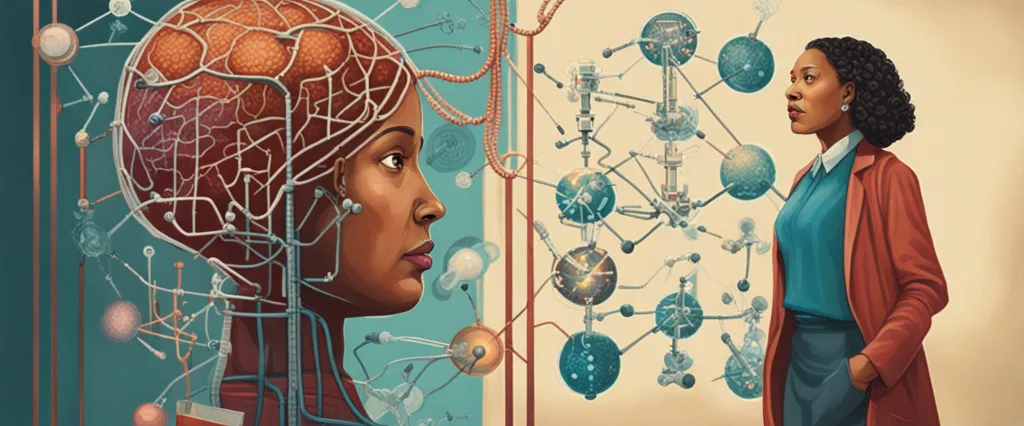——The Immortal Life of Henrietta Lacks by Rebecca Skloot & Survival of the Sickest by Sharon Moalem

Introduction:
Literature has the remarkable ability to transport us into different times, places, and minds. It offers a captivating lens through which we can explore the complexities of the human condition. The Immortal Life of Henrietta Lacks by Rebecca Skloot and Survival of the Sickest by Sharon Moalem are two such literary works that delve deep into the realm of medical miracles, exploring the wonders and challenges that arise in the face of human biology.
Both books shed light on extraordinary cases and revolutionary scientific advancements, presenting thought-provoking narratives that bridge the gap between science and society. Skloot’s The Immortal Life of Henrietta Lacks introduces us to the story behind the HeLa cell line, derived from Lacks’ cervical cancer cells without her knowledge, a discovery that transformed modern medicine. On the other hand, Moalem’s Survival of the Sickest delves into the evolutionary perspective on human health, delving into fascinating theories about why certain diseases still persist, despite being harmful.
While the books differ in their subject matter and focus, they share a central theme: the intricate relationship between human biology and the wider world. In this comparative study, we aim to explore these works side by side, bringing together their unique perspectives and insights. By analyzing the narratives, characters, and scientific discoveries contained within these texts, we hope to uncover the deeper truths about genetic inheritance, medical ethics, and the far-reaching impact of scientific research.
With The Immortal Life of Henrietta Lacks, Skloot invites us to question the ethical boundaries surrounding medical research, consent, and ownership of biological materials. By intertwining the story of the Lacks family with the scientific breakthroughs enabled by Henrietta’s cells, Skloot weaves a tapestry of both human suffering and scientific triumph. Meanwhile, Moalem, in Survival of the Sickest, challenges conventional wisdom by examining how certain genetic traits that cause disease have been passed down through generations due to their evolutionary advantages. His exploration of diseases such as hemochromatosis and sickle cell anemia exposes us to the intricate dance between our bodies and our environment, leading to a deeper understanding of human vulnerabilities.
Through this comparative study, we embark on a journey that intertwines the ethical with the evolutionary. We seek to uncover the connections and disparities between medical breakthroughs that have shaped the course of human lives and the societal implications of these discoveries. By examining the successes and shortcomings of both Skloot and Moalem’s works, we will gain a nuanced perspective on the convergence of science, ethics, and the human experience.
In the subsequent chapters of this comparative study, we will delve into the unique qualities that set The Immortal Life of Henrietta Lacks and Survival of the Sickest apart, examining their narrative structures, the depth of scientific research, and the impact they have had on readers and the scientific community alike. By drawing insights from both books, we aim to widen our understanding of medical and biological advancements while grappling with the moral questions that arise in their wake.
Brief Summary of Two Books
The Immortal Life of Henrietta Lacks by Rebecca Skloot
“The Immortal Life of Henrietta Lacks” is a non-fiction book written by Rebecca Skloot, published in 2010. The book explores the life and legacy of Henrietta Lacks, an African-American woman whose cancer cells were unknowingly taken and used for scientific research in the 1950s. These cells, known as HeLa cells, have since become vital in numerous medical breakthroughs, including the development of the polio vaccine, cloning, and gene mapping.
Skloot tells the story of Henrietta Lacks and her family, delving into the ethical issues surrounding medical research and the exploitation of black patients during that era. The book examines the impact of HeLa cells on medical science, while also highlighting the Lacks family’s struggle with poverty and lack of healthcare access.
Skloot also delves into the Lacks family’s personal experiences, including their feelings of loss, confusion, and the mistrust of the medical community. The author develops a close relationship with Henrietta’s daughter, Deborah Lacks, and together they uncover the story behind the HeLa cells and their impact on the medical world.
Throughout the book, Skloot incorporates narrative elements along with historical and scientific research, providing a comprehensive account of the life and enduring contribution of Henrietta Lacks. “The Immortal Life of Henrietta Lacks” examines the intersection of race, ethics, and medical advancements, shedding light on the often-unexplored stories behind scientific breakthroughs.
Survival of the Sickest by Sharon Moalem
“Survival of the Sickest” by Sharon Moalem is a compelling scientific exploration of human genetics and the role of diseases in our evolution. Moalem presents the idea that many seemingly harmful diseases and genetic traits have actually played a significant role in ensuring our survival as a species throughout history.
The book delves into various medical conditions, such as hemochromatosis, malaria, diabetes, and even the common cold, to demonstrate how these illnesses have influenced human biology. Moalem introduces intriguing concepts like the evolutionary advantage of sickle-cell anemia, which protects against malaria, and how certain genetic variations can contribute to the development of diseases like diabetes but also provide survival benefits in times of famine.
Moalem also examines how our ancestors’ interactions with bacteria and viruses have influenced our genetic makeup. He highlights the ways in which certain microbes have shaped human evolution and contributed to the development of our immune systems. The author argues that understanding the history of diseases and the factors that have influenced our genetic diversity can provide valuable insights into our current health problems.
Overall, “Survival of the Sickest” combines scientific knowledge with captivating storytelling to shed light on the intricate connections between human genetics and diseases. It challenges conventional views on illnesses and proposes new perspectives on the role of beneficial illnesses in shaping our species’ resilience and survival.
Comparison between Two Books

Similarities in Medicine
The Immortal Life of Henrietta Lacks by Rebecca Skloot and Survival of the Sickest by Sharon Moalem are both captivating books that explore the field of medicine from different angles. Despite their distinct narratives, there are several similarities between these books in relation to medicine. Let’s delve into some of these similarities:
1. Ethical concerns: Both books raise important ethical questions regarding the use of human samples in scientific research. In The Immortal Life of Henrietta Lacks, the author discusses the exploitation of Henrietta Lacks’ cells without informed consent or acknowledgement of her contribution to medical advancements. Similarly, Survival of the Sickest sheds light on controversial experiments conducted throughout history, such as the Tuskegee Study, where untreated African American men were observed to study the progression of syphilis. Both books challenge the medical community’s ethical responsibility towards patients and the need for informed consent and fair treatment.
2. Medical advancements: Both books highlight significant medical breakthroughs that have had enormous impacts on healthcare. The Immortal Life of Henrietta Lacks focuses on the discovery of HeLa cells, which became the foundation for numerous scientific advancements, including vaccines, gene mapping, and cancer treatments. Survival of the Sickest delves into evolutionary medicine, revealing how certain diseases, such as sickle cell anemia, were once adaptations that protected individuals against other deadly diseases like malaria. Both books emphasize the importance of scientific progress in medicine and how it can shape the health outcomes of individuals and society.
3. Disease research: Another similarity is the exploration of diseases and their impact on human health. The Immortal Life of Henrietta Lacks examines the devastating effects of cancer on Henrietta Lacks and her family, while also shedding light on the stigma surrounding healthcare in marginalized communities. Survival of the Sickest explores various diseases, such as hemochromatosis and diabetes, and their evolutionary origins. Both books emphasize the importance of disease research in understanding and combating these illnesses for improved healthcare outcomes.
4. Access to healthcare: Both books touch upon the disparities in access to healthcare resources. The Immortal Life of Henrietta Lacks portrays the lack of access to quality healthcare faced by the Lacks family, who could not afford medical treatments despite the immense contributions made by Henrietta’s cells to science. Similarly, Survival of the Sickest highlights how socioeconomic factors can influence an individual’s access to healthcare, leading to disparities in health outcomes. Both books shed light on the need for equitable access to healthcare resources and the impact it has on individual lives.
In conclusion, The Immortal Life of Henrietta Lacks and Survival of the Sickest share several similarities when it comes to medicine. They both raise ethical concerns, explore medical advancements, delve into disease research, and highlight the significance of equitable access to healthcare. These books offer thought-provoking insights into the field of medicine and its impact on individuals and society as a whole.
Divergences in Medicine
The Immortal Life of Henrietta Lacks by Rebecca Skloot and Survival of the Sickest by Sharon Moalem are both intriguing non-fiction books that explore various aspects of medicine. While both books touch upon the intersection of science and human life, they diverge in their focus, with Skloot’s work delving into ethics and human rights within medicine, while Moalem’s book focuses more on evolutionary biology and the survival instincts of humans.
In The Immortal Life of Henrietta Lacks, Skloot intricately weaves a narrative that centers around the story of Henrietta Lacks, a Black woman whose cells were taken without her consent and became one of the most important tools in medical research. The book delves into the ethical dilemmas surrounding informed consent, medical privacy, and racial injustices within the medical field. Skloot shines a spotlight on the exploitation of Henrietta Lacks and her family, shedding light on the systemic issues that persist in medicine, particularly regarding marginalized communities. This book prompts readers to question the boundaries of medical technology and the importance of informed consent in advancing medical research.
On the other hand, Survival of the Sickest by Sharon Moalem explores the field of evolutionary biology and its impact on human health. Moalem delves into the concept of survival instincts and how our genetic makeup has been influenced by ancient diseases and environmental factors. He discusses how certain genetic mutations or diseases that were once considered detrimental to our well-being might have actually conferred evolutionary advantages, aiding an individual’s survival in specific environments. For example, Moalem explains how diseases such as malaria have shaped the prevalence of certain genetic conditions like sickle cell anemia as a form of protection against the disease. Survival of the Sickest takes a broad approach in examining the intricate relationship between genetics, evolution, and human health.
In summary, while both books present different perspectives on medicine, The Immortal Life of Henrietta Lacks focuses on the social and ethical issues within medical research, while Survival of the Sickest explores the evolutionary biology behind human health. They offer distinct but equally important narratives that contribute to our understanding of medicine in different aspects of human life.

Conclusion
Both “The Immortal Life of Henrietta Lacks” by Rebecca Skloot and “Survival of the Sickest” by Sharon Moalem are highly regarded books that offer unique perspectives on scientific and medical topics. However, the worthiness of reading a book ultimately depends on personal preference and interests. Here are brief descriptions of each book to help you make a decision:
1. “The Immortal Life of Henrietta Lacks”:
This nonfiction book tells the story of Henrietta Lacks, a poor African American woman whose cells were taken without her knowledge or consent in the 1950s. These cells, known as HeLa cells, became the first immortal human cell line and have been invaluable to medical research. Rebecca Skloot delves into the ethical implications surrounding the Lacks family, who were largely unaware of the contribution their mother’s cells made to science. This book combines science, ethics, and personal narratives to shed light on important issues.
2. “Survival of the Sickest”:
Sharon Moalem explores the intriguing concept that certain diseases or genetic traits that may seem adverse at first glance have actually provided survival advantages throughout history. Through a combination of scientific research, history, and personal anecdotes, Moalem demonstrates how conditions like hemochromatosis, diabetes, and others have played a role in human survival and evolution. This book provides a thought-provoking perspective on the often complex relationship between disease and human biology.
Ultimately, the choice between the two books depends on your personal interests. If you are more interested in the intersection of science, ethics, and personal narratives, “The Immortal Life of Henrietta Lacks” may be the better choice. However, if you are fascinated by the ways in which diseases and genetic traits have influenced human evolution, “Survival of the Sickest” may be more intriguing.



